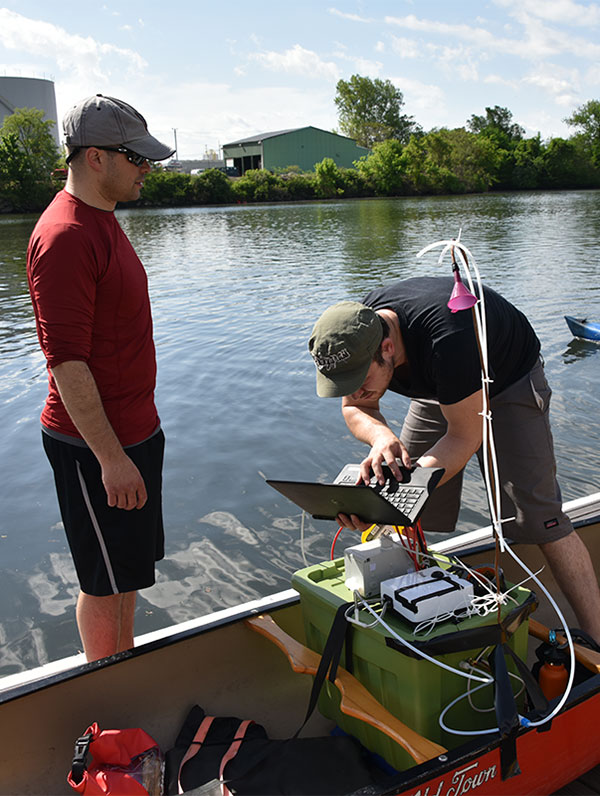Master of Science in Environmental Engineering

An environmental engineering master’s degree from Drexel University provides expanded skills that will further careers in research or practice in areas that tackle solutions for controlling, and reducing or eliminating impacts on animals, plants, human populations and surroundings from the effects of adverse environmental factors. Environmental engineers are trained to design systems, policies and processes that provide more healthful air, water and land for people and allow more sustainable existence. As a student you will address continuing needs relating to evolving conditions, contaminants such as physical, chemical and biological, waste management, and water and stormwater management.
As a student in the environmental engineering graduate degree program, you will be empowered to solve complex issues encountered in the many industries that have environmental impact, such as infrastructure, structures, climate change and related fields. Learn about the advances in industry, gain a global viewpoint, build entrepreneurial and teambuilding skills needed to advance your career or graduate prepared for entry into a PhD program.
Delivery
- On-campus
- Full-time or part-time
- The program will take 15-18 months to complete on a full-time basis or can be completed on a part time basis in approximately 4 years.
Areas of Specialization
The environmental engineering MS degree allows for flexibility in your plan of study. The focus can encompass a broad range of technical knowledge or one that is more targeted to a specific interest. The following are some examples of topical areas for electives:
- Air pollution
- Hazardous and solid waste
- Human health risk assessment
- Water resources
- Water and wastewater treatment
- Sustainability
The choice of courses available to students is not limited to those within the realms of environmental engineering. The program is interdisciplinary by nature and many students take classes from architectural, civil engineering, environmental science, chemistry, mechanical engineering, environmental policy, and mathematics.
Curriculum and Requirements
- The master’s degree requires a total of 45 credits; 15 credits must be in the major field of interest; 9-12 credits are for specialization; and 12 credits are dedicated to a four-course cluster of environmental engineering or environmental science sequence coursework.
- Remaining credits are taken as electives or as a thesis.
- Full time master’s students may opt to do a thesis consisting of six research credits and three thesis credits.
Graduate advisors will consult with you on the choice and scheduling of core and elective courses. Visit the Drexel Catalog for more information or learn more about our admissions requirements.
About Drexel Engineering

The Civil, Architectural and Environmental Engineering (CAEE) Department seeks to turn out a well-rounded engineer. The environmental engineering program at Drexel places a premium on a multidisciplinary approach, building on other branches of engineering — especially within civil, chemical, and mechanical engineering, as well as many of the sciences, such as chemistry, physics, biology, ecology and public health.
Drexel students are encouraged to be innovative and imaginative in identifying a problem and analyzing potential approaches in the quest for a solution. The focus of our programs is to equip you with the tools for finding sustainable and achievable outcomes to solve for society’s biggest challenges while making them relevant to your career goals.
Students have access to department lab and research facilities such as our 400 square foot clean room and other industry standard equipment and software. Learn more about our facilities.
Faculty
Drexel places a high value on industry connections and experience at every level. Teaching faculty in the CAEE department are experts with industry experience or are at the forefront of research and teaching.
Philadelphia
The city of Philadelphia is our campus – a diverse urban environment with a variety of social, cultural, and learning opportunities that will enrich your educational experience. Philadelphia is also a draw for talented instructors and researchers, meaning you will engage with some of the best minds in engineering and other disciplines. Learn more.
Research
Students in the master’s in environmental engineering program may have the opportunity to engage in research as part of their degree or as extra-curricular participation. Full-time master’s degree candidates are encouraged to base their master’s thesis on some aspect of faculty research for an invaluable learning experience.
Current faculty research helps us to aid in the areas that are of great importance in our society, including transportation, building performance, clean environment and green energy, environmental health, indoor air quality and many others.
Visit research and design for more about other research activity at the College of Engineering.
Career Opportunities in Environmental Engineering
Master’s in Environmental Engineering will prepare you for continuing your education in a PhD program or for pursuing advanced technical, research or management positions in organizations such as consulting firms, industrial corporations, government agencies or utilities.
Overall, employees with graduate degrees can earn up to 28 percent more than bachelor’s degree holders over their career. In environmental engineering, the outlook for jobs is good, with employment expected to grow faster than the average American job growth rate at 4% through 2034, according to the Bureau of Labor Statistics. They further report that environmental science occupations enjoy a boost of up to 29 percent in salaries when earning a master’s degree. Strong salary projections and continued demand due to changing regulations and the impact of climate change will keep demand high for skilled workers in this field.
Apply Now Graduate Admissions Department Page